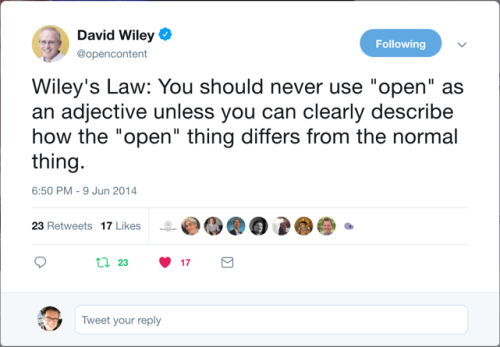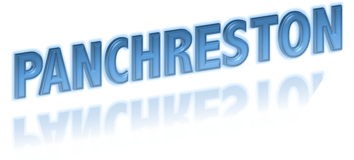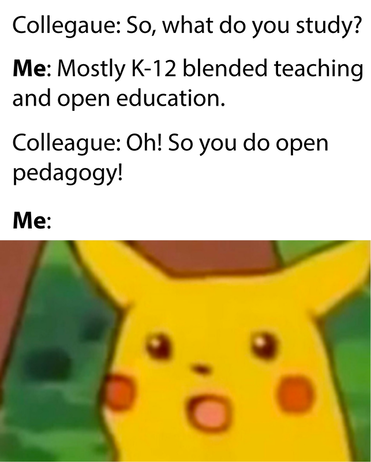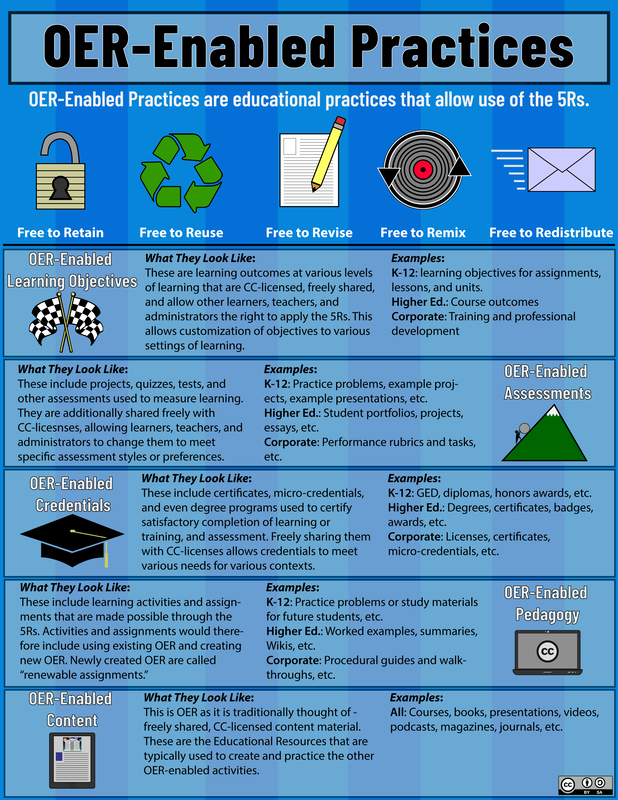|
As I began thinking about this blog post, I was drawn to an article reporting that Dictionary.com has just announced their word of the year - “misinformation.” As I reflect on what I have experienced in the news, media, social networks, and personal conversations throughout 2018, I feel as if “misinformation” was a great choice. Dictionary.com defined their choice as different from another word that might have been fitting - “disinformation” - as follows. Misinformation - “false information that is spread, regardless of whether there is intent to mislead.” Disinformation - “deliberately misleading or biased information; manipulated narrative or facts; propaganda.” The difference between the two words is the intent of the one disseminating the information. Spreading false information unintentionally is called “misinformation,” while the intentional spread of false information is “disinformation.” But what does this have to do with OER? I’m glad you asked. As I have begun studying Open Educational Resources (OER) over the last year, I have come across many examples of misinformation. For example, at AECT this year I asked a fellow attendee how he felt about his first Breakfast of Champions. His response was, “Well … I learned that Open doesn’t have to be free.” This was misinformation. Despite the fact that many people can’t agree on a singular definition of “open” most can at least agree it means “free.” However, the use of the term “open” seems to have suffered from years of misinformation, as no one really seems to know what the word means when used as an adjective to describe some realm of OER outside of content. (And even then the use can be a bit hazy.) I recommend that those using the word “open” recognize Wiley’s Law when doing so. It is with this concept in mind that I present to you the OER Word of the Year for 2018 (and possibly the foreseeable future)! Ladies and Gentleman, I give you… Merriam-Webster defines the word as “a broadly inclusive and often oversimplified thesis that is intended to cover all possible variations within an area of concern.” And Dicitonary.com defines the word as “a proposed explanation intended to address a complex problem by trying to account for all possible contingencies but typically proving to be too broadly conceived and therefore oversimplified to be of any practical use.” This is the current state of the word “open” as used in reference to many activities related to education. For example, “open-pedagogy” is term that dates back to the 1970s. This means that it pre-dates the “openness” that is afforded through the use of the internet, i.e., the openness that makes OER possible, the openness that helped spur the creation of Creative Commons licenses. The term “open-pedagogy” can mean:
(TL;DR too many dang things, “open pedagogy” is a panchreston) Did you know that by reading this blog post you are participating in some form of open pedagogy? Because “open pedagogy” has become a panchreston, David Wiley has proposed a new term to use as part of the OER landscape that does not have the baggage of “open pedagogy.” That term is “OER-enabled pedagogy.” Wiley (2018) defines OER-enabled pedagogy as “the set of teaching and learning practices that are only possible or practical in the context of the 5R permissions which are characteristic of OER.” This means OER-enable pedagogy allows for the creation of assignments and instruction that can be:
This new term clarifies what pedagogy looks like in the world of OER. But, it has caused me to wonder what other OER-enabled practices would look like. In a previous post, I mused about the landscape of OER, and what it looks like in terms of what kind of OER currently exist. I used similar categories to define OER-enabled practices. The following graphic summarizes my thoughts concerning OER-enabled learning objectives, OER-enabled assessments, OER-enabled credentials, OER-enabled pedagogy, and OER-enabled content.
0 Comments
|
About
This blog presents thoughts that Cecil has concerning current projects, as well as musings that he wants to get out for future projects. For questions or comments on his posts, please go to his Contact page. Archives
April 2024
Tags
All
|




 RSS Feed
RSS Feed
